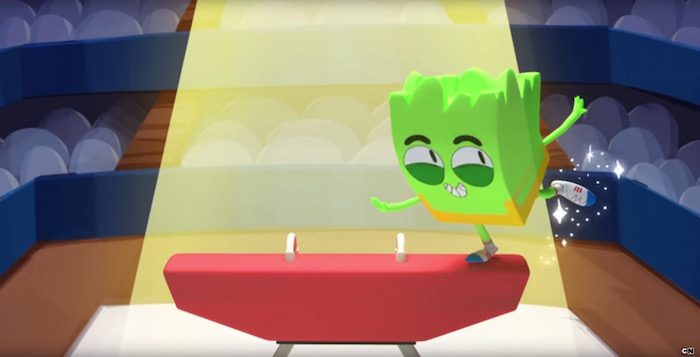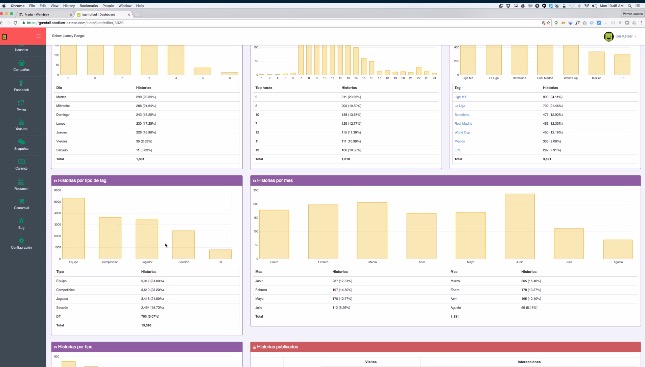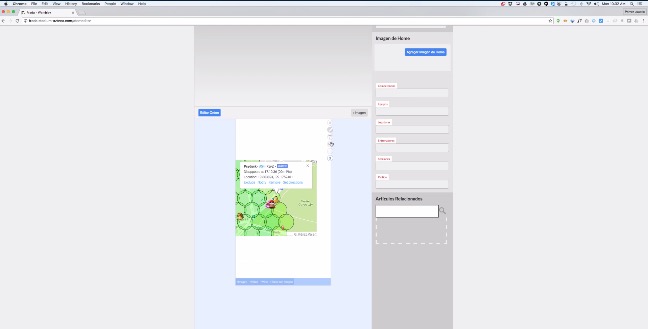
The Mexican men’s Olympic soccer team entered its game against South Korea earlier this month needing a win to advance to the knockout round. El Tri, as the Mexican team is known, won the gold medal in 2012, but if they didn’t win they would be returning home from Rio empty handed. The stakes were high, and the Mexicans squandered a number of close chances. The score remained tied at zero late into the game.
 Using its mobile-only Atom story format, the Mexican sports startup Juanfutbol captured all the anxiety in realtime.
Using its mobile-only Atom story format, the Mexican sports startup Juanfutbol captured all the anxiety in realtime.
Juanfutbol introduced Atom for the Olympics, and the stories look and feel like Snapchat or Instagram stories — users flip through individual slides — but they live on Juanfutbol’s own website and allow for outside photos and embedded videos.
“We could decide the length of our videos, we could put our own photos without any problem…what we wanted to do was have the better experience for users on mobile devices,” said Mauricio Cabrera, Juanfutbol’s general manager.
“If you see other competitors, they all have the same way for play-by-play or minute-by-minute, so now we are testing this add-on [to reach] the millennials that are using Snapchat, Instagram, and these kind of social networks,” he said.
 Many of the Atoms featured the site’s namesake and mascot, and as the game progressed Juanfutbol became increasingly distraught. When South Korea finally broke through with the winning goal in the 77th minute he said, “Yo ya perdí toda esperanza” — I’ve lost all hope.
Many of the Atoms featured the site’s namesake and mascot, and as the game progressed Juanfutbol became increasingly distraught. When South Korea finally broke through with the winning goal in the 77th minute he said, “Yo ya perdí toda esperanza” — I’ve lost all hope.
Aside from live event coverage, Juanfutbol has used Atom to publish feature stories and preview each day of the Olympics. It’s using the format for native advertising as well.
Atom only works on Juanfutbol’s mobile site, and since it launched for the opening ceremonies on Aug. 5, the site says the format has attracted about 500,000 users. It’s working on adding Atom to its own app as well.
When publishers are seeing so much of their audience diverted to social platforms, Atom and other story formats Juanfutbol has built are part of an attempt to attract users back to its own properties.
“Today we are not in an era of websites and homepages, so it was just about trying to find ways of how we can make our site attractive again,” CEO Miguel Ramírez told me. “It’s been attractive ever since we launched it, but when you give such a good offering on social, sometimes you have to question yourself: What is the reason for a website to exist?”
Juanfutbol has jumped firmly on the distributed content bandwagon. It’s all over social, and even created Facebook-only products that have their own mascots, such as Fridapop, which is aimed at women, and Juanfutroll, which publishes memes. It has a Telegram bot, and is in the process of developing a Facebook Messenger bot. It’s creating a custom gif and sticker app and keyboard. It even signed a deal with Cartoon Network to produce videos featuring the Juanfutbol character that started with a series of Olympic videos. The site is trying to get its content — and its cartoon mascots — in as many places as it can.
The site debuted in 2014, and Juanfutbol says it reaches 17 million unique users across all its platforms. Its prime demographic is 13- to 24-year-olds. Eighty-five percent of its traffic comes from mobile devices.
While Juanfutbol has come of age in the era of distributed content and mobile platforms, the team behind the site got their start in an earlier era of the web. In 2000, they created the sports site MedioTiempo, which primarily covers soccer. In 2008, they sold a majority stake in the site to a subsidiary of Time Inc., and ultimately left the company in 2012. (Time sold the subsidiary, Grupo Expansión, in 2014.)
“It’s funny to say that we’ve been in this business for 16 years, but the industry where we are in today is completely different than the one we dominated a decade ago with MedioTiempo,” said Ramírez.
After their non-compete clauses expired, they built Underdog, Juanfutbol’s parent company. (Underdog’s website also features Soccerly, an English-language soccer site, but it hasn’t been updated since April and soccerly.com redirects to Juanfutbol’s site.)
The company is VC-backed, and while Ramírez wouldn’t specify how much funding Underdog has received, he characterized it as “at least a couple of million dollars.” They also wouldn’t specify how much revenue the company is bringing in, but Ramírez did say that Underdog is not yet profitable. About 70 percent of Underdog’s revenue comes from content marketing, he said. The company has its own native advertising agency, Tiki Taka Studio.
The company now has a staff of about 35, and it’s continuing to tweak its stable of products and build out new ones.
Everything Juanfutbol publishes — from Atoms and narrative interactives to push notifications, Facebook posts, and Telegram bot messages — originates in the company’s custom built CMS, Frada. It also has its own analytics system, Gandalf, that allows staffers to get segmented views on different pieces of content across all the platforms where Juanfutbol publishes in realtime. It also allows users to track analytics by story tag, so you can see, for example, how readers are consuming all of Juanfutbol’s Olympic coverage.

The CMS is designed so that staffers can create the various story formats quickly without working with an editor.
Frada was also designed to highlight mobile consumption. With Atom, for instance, the posts are created in Photoshop and then imported to the CMS, but the input field is designed to reflect the size of a phone screen so staffers will see how it will look for users.

“We also have a preview button, but most of our editors don’t use it because it’s another step for them to go back to the editor, and it’s going back and forward,” lead developer Gerardo Ezquerra said. “We decided it would be better for them…to see on the mobile device.”
Internet usage in Mexico is growing rapidly. There were 65 million internet users in Mexico in 2015, according to an April study by the Asociación Mexicana de Internet. That equates to 59 percent of the country’s population, an increase from 51 percent in 2014. And of those internet users, 77 percent say they use a smartphone to get online — and 92 percent said they use Facebook.
As a result, Juanfutbol will continue to emphasize the quick development of mobile and social products.
The Atom format was developed in about a month leading up to the Olympics. It unveiled Fridapop earlier this summer only as a Facebook page after advertisers asked about products aimed more at a female market.
“When you get asked that question several times, you say, well there’s an opportunity here, probably not as big as the other one, but let’s go and test it,” Ramírez said. “So rather than go and launch a new site, which we think is probably not the way to go, why don’t we try a new approach?”